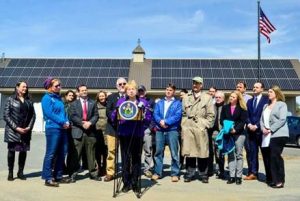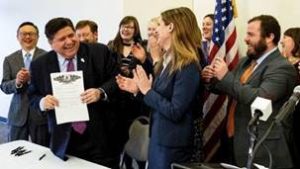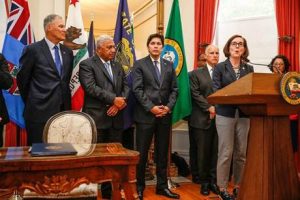Happening in the States: Dem Govs Fighting Climate Change, Protecting Environment
Earth Day serves as an annual call to action to protect the environment and curb the effects of human impact on the planet. This year, that action is happening in the states. Ever since the Trump administration abdicated its role in fighting climate change and preserving clean air and water, governors have stepped up to lead the charge both at home and on the global stage. With their leadership, states are reducing emissions, investing in renewable energy, and building greener economies.



Here are a few of the ways Democratic governors are working to protect the environment and fight climate change:
Rhode Island: Gov. Gina Raimondo joined the U.S. Climate Alliance and lead the effort to reduce the use of plastics across the state.
California: Gov. Gavin Newsom unveiled a plan this year to zero out the state’s greenhouse gas emissions by 2045, which was ordered by his predecessor Gov. Jerry Brown.
Colorado: Gov. Jared Polis has committed to transitioning to renewable electricty by 2040, the most ambitious goal of any state in the country. He also signed an executive order to develop infrastructure for more electric vehicles and to move the state’s fleet towards electric vehicles.
Hawaii: Gov. David Ige joined the U.S. Climate Alliance, and has committed the state to becoming carbon neutral by 2045, one of the most ambitious goals in the entire nation.
Illinois: Gov. JB Pritzker joined the U.S. Climate Alliance and has the state on track to reach a goal of generating 25% of its energy through renewable sources by 2025.
Maine: Gov. Janet Mills joined the U.S. Climate Alliance, committed the state to reaching 100% renewable electricity by 2050, and signed a law to make solar energy projects more accessible and affordable.
Michigan: Gov. Gretchen Whitmer joined the U.S. Climate Alliance, created a new office of Climate and Energy and created the state’s first Clean Water Public Advocate and Environmental Justice Public Advocate positions.
Minnesota: Gov. Tim Walz unveiled a plan to transition to renewably generated electricity by 2050 and help Minnesotans improve the energy efficiency in their homes.
Montana: Gov. Steve Bullock ordered the state to have its first ever climate assessment to help businesses and farmers understand the full effects of climate change on the state.
Nevada: Gov Steve Sisolak joined the U.S. Climate Alliance and is pushing energy providers to make at least 50% of their energy from renewables by 2030.
New Jersey: Gov. Phil Murphy joined the U.S. Climate Alliance and is prepared to rejoin the Regional Greenhouse Gas Initiative, pledging to reduce emissions in the state by 36% in ten years. He also established a offshore wind subsidy that aims to produce enough energy to power 1.5 millions homes by 2030.
New Mexico: Gov. Michelle Lujan Grisham joined the U.S. Climate Alliance and created the New Mexico Climate Change Task Force that will force state agencies to modernize and mitigate their impacts on the climate.
New York: Gov. Andrew Cuomo made his state a founding member of the U.S. Climate Alliance. He also instituted the first ever state clean energy mandate, ensuring that 50% of energy is produced by renewables by 2030.
Oregon: Gov. Kate Brown joined the U.S. Climate Alliance and represented the United States at international climate meetings. She has also signed legislation requiring engine upgrades for school buses, instituting mining protections for river habitats, and establishing the Cleaner Air Oregon program.
Pennsylvania: Gov. Tom Wolf issued an executive order this year establishing the first ever statewide goal to reduce carbon emissions. The state will work towards reducing emissions by 26% by 2025 and 80% by 2050.
Washington: Gov. Jay Inslee was a founding member of the U.S. Climate Alliance. He established the state’s Clean Energy Fund, which has supported more than $100 million in clean energy projects. He is also overseeing the largest solar project in the state’s history.
Wisconsin: Gov. Tony Evers joined the U.S. Climate Alliance. He also declared 2019 the year of clean drinking water, proposing a plan to devote $70 million to replace lead pipes and combat water pollution.




